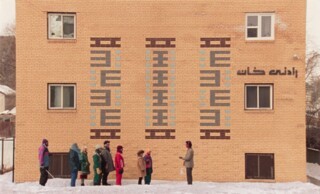‘Universal Language’
Saleem Vaillancourt
‘I always like to say that Iranian cinema emerges out of a thousand years of poetry, and Canadian cinema emerges out of fifty years of discount furniture commercials,’ Matthew Rankin said at a recent screening of his movie Universal Language. I come from both countries, but it’s the furniture gag that struck home. Written by Rankin, Pirouz Nemati and Ila Firouzabadi, the film is set in a version of Canada where the official languages are French and Persian. Buildings are covered with Persian signs (one says ‘Robert H. Smith School’); carts sell cooked beets, an old Iranian staple.
When I spoke with Rankin and Nemati after the screening, they said the movie is neither Iranian nor Canadian (though it’s Canada’s submission for Best International Feature at the Oscars). Nemati, who plays a tour guide showing visitors around Winnipeg (‘this is one of the first residential structures in the historic beige district’), recalled the praise offered by one ‘Iranian grandma’ at a Toronto screening. ‘She wasn’t a cinephile, but she said she just felt the film,’ that it connected people during a time of ‘distance’. Universal Language is not didactic, Rankin said, but ‘the experience of watching it does propose a way of looking at the world, and I think that’s what people respond to.’
While Nemati plays a character based on Rankin’s father, Rankin plays Matthew (he was ‘miscast’ as himself, he said at the screening), who leaves his bureaucratic job in Quebec and travels home to Winnipeg to visit his sick mother. He’s an isolated figure. The isolation persists even when the only other bus passenger sits right beside him. Matthew swallows dozens of sleeping pills to cope with the strain. ‘We live in a time when solitude has become almost weaponised,’ Rankin told me. During the pandemic there was a hope that, after it, we would live in a world with more solidarity and less stress, he said, ‘but the opposite has happened.’
Another storyline follows two sisters, Negin and Nazgol, who find a banknote frozen in the ice. Negin needs the money to replace a friend’s pair of glasses – apparently stolen by a turkey, one of many in the film – so their psychotic teacher will let him back into class. Rankin’s grandmother found two dollars in the ice during the Great Depression. Many of the Iranian films that influenced Universal Language show children ‘encountering the desperation of adulthood’, Rankin said.
‘I liked that there was this strange echo on the other side of the world,’ he said, between his family’s history and Iranian cinema. I suggested that Universal Language speaks to the strand in Iranian culture that uses the particular to speak to the universal. The ‘Iranian-ness’ in the film ‘is not really Iranian-ness’, Nemati replied. He mentioned the Saadi poem at the entrance to the United Nations building in New York. ‘Persian poetry became universal because it wasn’t Iranian any more,’ he said. ‘Winnipeg, in Persian, loses itself and finds itself again.’
According to Rankin, the film inhabits ‘this new third space … at the confluence of different stories and experiences and understandings and baggage, and that’s what’s fun about the movie. It doesn’t belong in one Tupperware container that is sealed off from all other Tupperware containers.’
I’ve known for a long time that, when I’m with Canadians, I feel more Iranian; when I’m with Iranians, I feel more Canadian. A life lived in halves. Thirty minutes into Universal Language, Matthew’s bus breaks down and he begins a long cold walk into town. A mournful 1970s Persian ballad strikes up. He walks past the stall selling the stewed beets. I may have understood only snatches of the lyrics, but for a few moments there were no Tupperware containers here.
